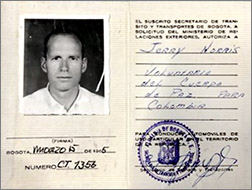An Orange for Christmas (Colombia)
By Jeremiah Norris (Colombia 1963-65)
 In December 1963, I was the only Volunteer in La Plata, a small village of some 3,000 residents, located in the foothills of the Andean mountains. Volunteers from an earlier group had all rotated home in November.
In December 1963, I was the only Volunteer in La Plata, a small village of some 3,000 residents, located in the foothills of the Andean mountains. Volunteers from an earlier group had all rotated home in November.
Just a few days before Christmas, I came down with a gastrointestinal infection that laid me so low I could hardly get out of bed and stumble into the bathroom. I was also taking an eight-count, feeling sorry for myself as I had not developed a single project in my first five months. I was too weak even to leave the house and seek medical attention.
Then, mysteriously, bowls of hot soup began appearing at my front door. When I opened it to see who was there, no one appeared! Somehow, a woman of very limited means who lived just down the street from my house, the mother of 8 children, had found out about my condition. The family was headed by Dona Lucia, tall and thin, obviously of native descent, and easily considered among the poorest households in La Plata. It was headed by Don Luis, an itinerant field hand, and one-eyed. But when he came home at night from the fields, his children greeted him as if he were some kind of King. He was most certainly ‘beloved’. When I found out who had been sending the soup over, I tried to pay Dona Lucia but she stoutly refused every attempt.
Then, on Christmas Day, one of her younger sons knocked on my door and presented me with a fresh orange—a Christmas present for me! The contributions of those so welcomed bowls of soup and that orange slowly led me to a recovery and out of a crisis of confidence. And—it was only much later, that I came to understand that that orange had been the young boy’s Christmas present from his mother.
In January 1964, two new Volunteers, Bob and Andy, were assigned to La Plata. Since we needed to eat and there wasn’t any real restaurant in La Plata, we decided to contract for our meals with Dona Lucia. She was delighted with the opportunity and went on to take care of all our meals for the next two years. What her family ate, we ate. And whenever there was meat in the pot, it went first to Don Luis—and none of us ever complained.
Andy went on to marry one of Dona Lucia’s daughters, RosaEmilia, and then to a professorship at the University of Illinois after completion of service. RosaEmilia went on to earn two MAs in Education and became a Senior Educator in Chicago’s Public Schools. Her first daughter, Susan, went on to marry a RPCV from Central America, who later became a PC/W staff member.
And, the young lad that gave me his orange as a Christmas present, went on to earn an M. D. He does so well in his practice in Neiva that the FARC sends him patients! His younger brother became Vice Mayor of Colombia’s second largest city, Cali.
I count my time with Dona Lucia’s family as far and away my most significant Peace Corps experience, way above the Ag Cooperatives and schools that we developed, some of which remain in operation today. Had it not been for the Peace Corps presence in La Plata, I often wonder how her family would have ever left from under the shadow of that giant tree in its Central Plaza—and sailed off to a wider world of opportunities.
Jerry Norris (1963-65) was stationed in La Plata and worked in community development.
This story and the others are so beautiful. I am moved to tears. Thank you,
Great story Jerry! I was in the highlands of Guatemala about eight years later and have my own being laid low with some intestinal ailment in a very isolated village, but the local ladies came through with home remedies which worked. But not on Christmas–and excellent story for this time of the year! Gracias
Mark
Wonderful story!
We were never at our assignments alone. There was already a community there and sometimes they looked out for us and sometimes we were aware enough to look out for them.
Outstanding Story Jerry. Felicidades.
Best,
G.
WONDERFUL TO SEE YOU AND HEAR YOUR VOICE IN THIS STORY. SALUDOS A TODOS
DAVID & BERNADETTE COLOMBIA 1963-65 & PC/W 66-70
Jerry: That is a wonderful story. There are so many lessons contained in there – kindness, generations emerging from poverty, the importance of education, the gift of family love, the contributions of immigrants, the simple recognition of the existence of ability and intelligence in those who have nothing and need nothing but a chance.
Thanks for sharing this story. Many times the interactions we had in our villages with the local population were more significant take-aways than anything formal. In Chad, a woman broke through my fence when she spied a snake threatening me. Here’s the link to the story on the website of the Museum of the Peace Corps Experience. Needless to say, I have never forgotten the snake stew we shared afterward.
https://www.museumofthepeacecorpsexperience.org/cpages/african-charm
The perfect Christmas story, Jerry. Thank you for writing and sharing it. Abrazos!
Jerry, Wonderful story. Reveals a lot about you andd the depths of Colombian culture. Muchas gracias.